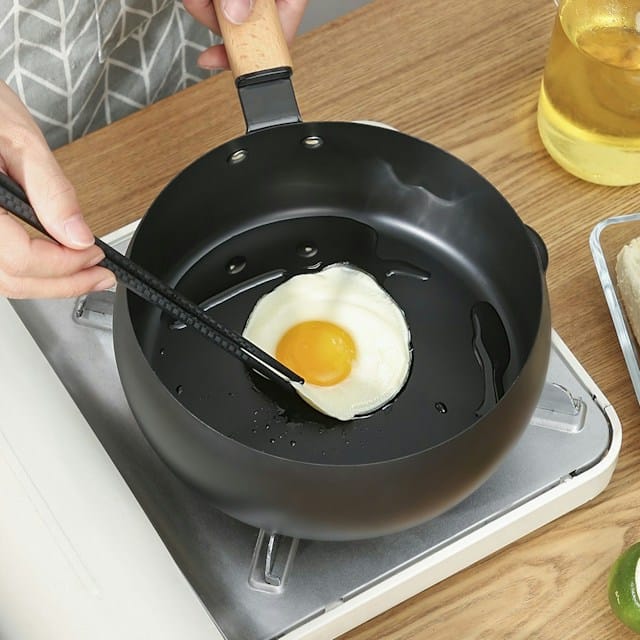What are the best techniques for frying perfect eggs?

In the culinary world, a perfectly fried egg is a universally revered delicacy. The fine balance of achieving a golden, crispy edge without overcooking the yolk is a testament to the cook’s skill. But, even for an everyday home cook, mastering the art of frying eggs isn’t as elusive as it seems. If you’ve been struggling with inconsistency or simply wish to perfect your egg-frying technique, you’re in the right place. This piece details the most effective strategies for frying eggs to perfection.
The Essential Ingredients
The perfect fried egg starts with high-quality ingredients, primarily the egg itself, and the fat you choose to cook it in.
Dans le meme genre : How to create a flavorful vegetarian chili?
When it comes to eggs, opt for fresh, free-range ones. Fresh eggs have a more robust flavor, and their yolks are brighter, rendering them perfect for frying. To test the freshness of an egg, place it in a bowl of water. Fresh eggs will sink, while older ones float because of the air they’ve absorbed over time.
Choosing the right fat is equally crucial. Butter and oil are the two most common options. Butter offers a rich, nutty flavor, while oils like olive or canola yield a lighter taste. For a truly gourmet experience, consider using a combination of butter and oil. The oil will raise the smoke point of the butter, preventing it from burning, while still imparting a rich flavor to the eggs.
Sujet a lire : Peugeot saveurs: elevate your culinary experience with quality mills
The Perfect Skillet
The foundation of a well-fried egg is the pan you use. A skillet, particularly a non-stick or cast-iron one, is ideal for frying eggs.
Non-stick pans are easy to use and require less fat, eliminating the risk of the egg sticking to the pan. On the other hand, cast-iron skillets offer an even heat distribution, ensuring the egg cooks evenly. However, they require a little more care to prevent sticking.
Regardless of your choice, ensure your skillet is impeccably clean. Leftover residues can interfere with the egg’s non-stick performance.
Heat Regulation
Understanding how to properly regulate heat is a critical factor in frying the perfect egg. Too hot, and your egg will cook too quickly, resulting in a rubbery texture and overcooked yolk. Too low, and your egg will take too long to cook, risking it becoming dry.
Start by heating your skillet over a medium heat. Once the pan is hot, add your chosen fat and let it melt. If using butter, wait until it stops foaming. The heat at this point is perfect for adding the egg.
The Art of Frying an Egg
When you’re ready to fry, crack the egg into a bowl first. This prevents any shell pieces from getting into your skillet and allows for a gentler placement into the pan.
Once the egg is in the skillet, decrease the heat to low. This is crucial to ensure the whites set without the yolk overcooking. The egg should sizzle gently. If it’s silent, the pan is too cold; if it’s a loud sizzle, it’s too hot.
For a fried egg, cook for about three minutes until the whites are set and the yolk is still runny. To achieve a sunny-side up egg, cover the pan after placing the egg to create a steamy environment that helps set the top of the egg without flipping. For an easy-side-up egg, flip it after the whites are set and cook to your desired doneness.
Recipe Variations
Frying eggs is not confined to the traditional sunny-side up or easy-side-up methods. There are various ways to tweak the recipe to suit your preferences.
For a crispy-edge egg, heat the oil until it’s shimmering but not smoking and then add the egg. The high heat will set the edges quickly, giving them a delightful crunch.
For a creamier, richer egg, try basting. Add a generous amount of butter to the pan, and as the egg cooks, spoon the hot butter over the yolk. This will result in a richer flavor and a slightly cooked yolk without having to flip the egg.
Mastering the art of frying eggs involves a blend of the right ingredients, perfect skillet, accurate heat regulation, and personalized recipe variations. With these tips in hand, you’re well on your way to frying eggs to perfection.
Seasoning and Finishing Touches
Adding the right seasoning to your fried eggs can elevate their taste to a new level. For a simple, classic fried egg, salt and pepper are all you need. Sprinkle them on the egg immediately after it’s done cooking while the whites are still a bit wet. This allows the seasoning to stick to the egg instead of bouncing off. If you want to experiment with flavors, you could use spices like paprika, chili flakes, or herbs like chives and parsley.
The finishing touches often involve adding a little extra flavor or texture. For a burst of freshness, a sprinkling of chopped herbs or a squeeze of lemon juice works wonders. For a creamy, indulgent touch, a spoonful of sour cream or a grating of fresh parmesan cheese is magnificent. And if you’re a fan of bold tastes, a drizzle of hot sauce or a spoonful of salsa can complement the richness of the fried egg.
Remember, the key to a great fried egg is in the details. The seasoning should enhance, not overpower, the natural flavor of the egg. And the finishing touches should be chosen thoughtfully, keeping in mind the balance and harmony of flavors.
Conclusion
Frying perfect eggs is an art that combines the use of the right ingredients, a suitable skillet, accurate heat regulation, and personalized recipe variations. It requires a good understanding of the cooking process, from cracking the egg to the final seasoning and finishing touches.
Remember, the key is to practice patience and consistency. Don’t be disheartened if your first few attempts don’t turn out as expected; keep trying and adjust the variables as needed. With persistence and the right techniques, you’ll soon be able to fry eggs to perfection – whether you prefer them sunny-side-up, easy-side-up, or with crispy edges.
Finally, don’t forget to experiment and have fun along the way. Try different fats, play around with heat settings, and explore a variety of seasonings. After all, cooking should be an enjoyable process, and there’s no better feeling than mastering a dish you love.
So, the next time you find yourself in the kitchen with a skillet, some eggs, and a desire to cook up a storm, remember these tips. Whether you’re an amateur cook or a seasoned chef, these techniques will help you fry eggs that are golden, crispy, and cooked to perfection. Happy cooking!
